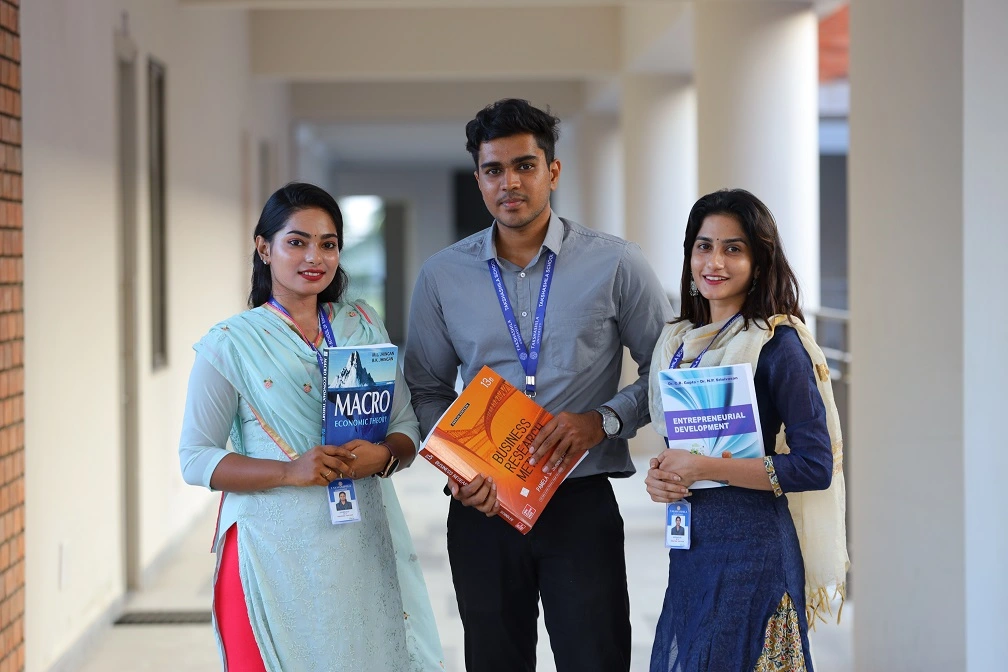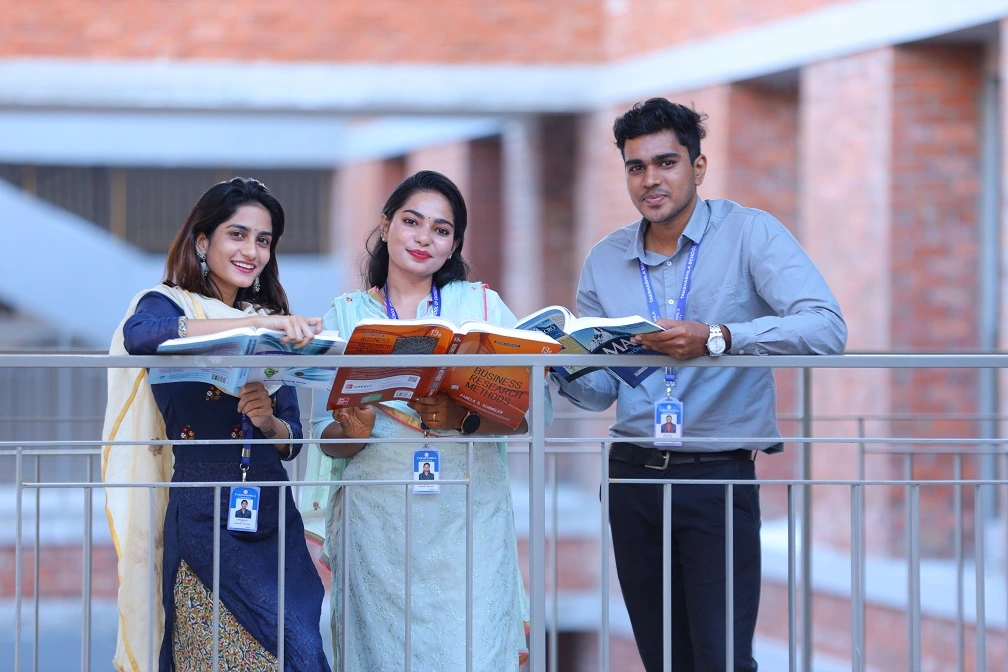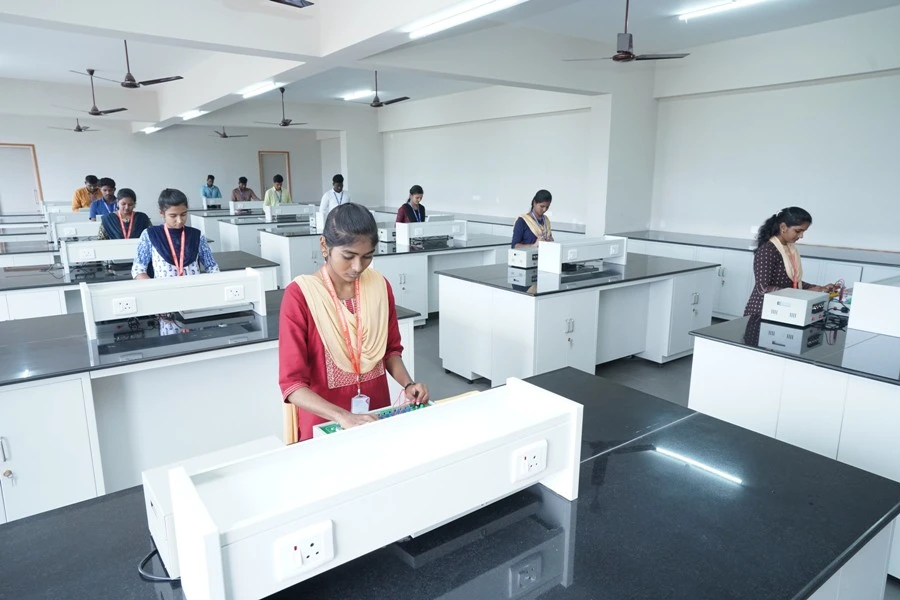Ph.D. Physics
- Hands-on Training
- Faculty with International Experience
- Advanced Curriculum
- Upto 100% Scholarship based on merit

About the Course
The Ph.D. in Physics at Takshashila University is designed to develop advanced research capabilities and a deep understanding of core and emerging areas in physics. This rigorous programme allows you to explore diverse specialisations such as quantum mechanics, condensed matter physics, astrophysics, particle physics, and applied physics.
You will engage in independent research under expert faculty guidance, contributing to the advancement of scientific knowledge. The programme also emphasises the development of critical thinking, analytical skills, and technical expertise, preparing you for academic, research, and leadership roles in both national and international institutions.
Course Curriculum

Year 1
The first year is focused on building a solid foundation in theoretical and experimental physics. You will explore core concepts while developing essential research and analytical skills required for advanced study. Coursework and seminars will help shape your research interests.
Key Subjects: Research Methodology, Classical Mechanics, Quantum Mechanics, Electrodynamics, and Mathematical Physics.
Year 2
In the second year, you will begin to narrow your focus to a specific research area while deepening your understanding of advanced topics in physics. You will also prepare your research proposal and begin early-stage investigations.
Key Subjects: Statistical Mechanics, Advanced Quantum Theory, Solid State Physics, Nuclear & Particle Physics, Literature Review and Research Proposal Development.
Year 3
The final phase of the programme centres on independent research work under faculty supervision. You will conduct experiments, simulations, or theoretical studies, leading to the submission and defence of your doctoral thesis.
Key Components: Thesis Research, Progress Presentations, Publications in Peer-reviewed Journals, and Final Dissertation Defence.
Programme Outcomes (POEs)
Upon completing the Ph.D. in Physics at Takshashila University, you will attain the following academic and professional competencies:
Advanced Research Skills
You will develop the ability to design, conduct, and analyse original research in specialised areas of physics, contributing new knowledge to the scientific community through publications and conference presentations.
Theoretical and Experimental Proficiency
You will gain a comprehensive understanding of core and advanced concepts in physics, enabling you to apply both theoretical models and experimental techniques to solve complex problems.
Independent and Collaborative Problem Solving
You will be capable of working independently and within multidisciplinary teams to explore and address fundamental questions in physics, using critical thinking and advanced analytical tools.
Scientific Communication
You will acquire the skills to effectively communicate complex scientific ideas through research papers, presentations, and academic discussions, tailored to both specialised and general audiences.
Ethical Research and Professional Conduct
You will understand and uphold high ethical standards in research, ensuring integrity, reproducibility, and responsible conduct in all scientific inquiries.
Career Readiness in Academia and Industry
You will be well-prepared for diverse roles in academia, research institutions, and high-tech industries, equipped with the expertise and experience to lead innovative projects and contribute meaningfully to scientific advancement.
Programme Outcomes (POs)
The Ph.D. in Physics will help you achieve the following broader learning outcomes:
PO1: Mastery of Core and Advanced Physics Concepts
You will gain a deep understanding of fundamental and advanced topics in physics, enabling you to explore specialised areas such as quantum mechanics, astrophysics, condensed matter, and high-energy physics.
PO2: Independent Research and Analytical Skills
You will develop the ability to conduct independent and original research, applying advanced analytical and problem-solving techniques to investigate and address complex scientific questions.
PO3: Proficiency in Experimental and Computational Methods
You will acquire hands-on expertise in experimental physics and computational tools, allowing you to design and execute experiments or simulations that contribute to cutting-edge research.
PO4: Scientific Communication and Dissemination
You will become proficient in articulating your research findings through high-quality scientific writing, presentations, and publications in peer-reviewed journals, enhancing your academic and professional visibility.
PO5: Ethical and Responsible Research Conduct
You will understand and uphold the ethical principles of scientific research, including data integrity, proper citation, and responsible use of resources and technology.
PO6: Contribution to Academia and Industry
You will be well-prepared to take on roles in academic institutions, research centres, and industries, contributing to innovation, teaching, and the advancement of scientific knowledge.
Programme Specific Outcomes (PSOs)
The Programme Specific Outcomes focus on the research-oriented and discipline-specific skills you will gain through this Ph.D. in Physics, allowing you to excel in specialised academic and scientific domains.
PSO1: Advanced Theoretical and Experimental Knowledge
You will develop specialised expertise in theoretical frameworks and experimental methodologies across various domains of physics, such as quantum mechanics, solid-state physics, and nuclear physics.
PSO2: Research Design and Methodology
You will gain the ability to design, conduct, and interpret independent research projects using sophisticated analytical tools, laboratory techniques, and computational simulations relevant to your area of specialisation.
PSO3: Scholarly Contribution to Physics
You will contribute original research to the scientific community, with the potential to publish in reputed journals, present at national and international conferences, and influence developments in the field of physics.
PSO4: Interdisciplinary Competence
You will be equipped to apply physics principles in interdisciplinary contexts such as materials science, nanotechnology, medical physics, or computational physics, fostering innovation and collaboration across scientific fields.
PSO5: Academic and Professional Readiness
You will be prepared for academic roles such as teaching and mentoring at university level, as well as research-intensive positions in government labs, private R&D sectors, and tech-based industries.
PSO6: Critical Thinking and Innovation in Problem Solving
You will refine your ability to apply critical thinking to complex scientific problems, encouraging innovative approaches and developing new theories or models that address unresolved questions in physics.
Career Scope
Upon completion of the Ph.D. in Physics, you will be well-equipped to pursue a range of academic, research, and industry-based roles. The field of physics offers vast career opportunities across universities, research institutions, government agencies, and private sectors, both in India and internationally. Here are some of the potential roles you can pursue:
Research Scientist
- Role: Conducting advanced research in areas like quantum physics, materials science, or space studies, often contributing to technological innovation and scientific understanding.
- Salary: ₹6,00,000 to ₹12,00,000 per annum (based on expertise and institution).
University Professor / Lecturer
- Role: Teaching undergraduate and postgraduate students, guiding research scholars, and contributing to curriculum development in academic institutions.
- Salary: ₹6,00,000 to ₹13,00,000 per annum (depending on institution and seniority).
Scientific Officer (Government/PSUs)
- Role: Working with government research organisations such as ISRO, DRDO, or BARC on scientific projects and national missions.
- Salary: ₹7,00,000 to ₹14,00,000 per annum.
Postdoctoral Fellow
- Role: Engaging in specialised research at academic or research institutions, often as a pathway to permanent academic or scientific roles.
- Salary: ₹5,00,000 to ₹9,00,000 per annum.
Data Scientist / Analyst (Tech Industry)
- Role: Applying analytical and mathematical skills to solve data-driven problems in sectors like IT, finance, and artificial intelligence.
- Salary: ₹6,00,000 to ₹15,00,000 per annum (depending on experience and sector).
Medical Physicist
- Role: Applying physics principles in healthcare settings, especially in radiation therapy, diagnostic imaging, and nuclear medicine.
- Salary: ₹6,00,000 to ₹10,00,000 per annum.
Materials Scientist
- Role: Investigating the properties and applications of materials for use in electronics, energy storage, manufacturing, and more.
- Salary: ₹6,00,000 to ₹11,00,000 per annum.
Astronomer / Astrophysicist
- Role: Studying celestial objects and phenomena, often in collaboration with space agencies or observatories.
- Salary: ₹6,00,000 to ₹12,00,000 per annum.
Patent Analyst / Intellectual Property Consultant
- Role: Evaluating and protecting scientific innovations through patent drafting, analysis, and legal consultation.
- Salary: ₹5,00,000 to ₹9,00,000 per annum.
The Ph.D. in Physics opens doors to high-impact careers across academia, industry, healthcare, space research, and data science, with strong potential for advancement and international opportunities.
What You Will Gain at Takshashila University

At the School of Science, Takshashila University offers an advanced and enriching academic journey for Ph.D. Physics scholars, designed to prepare you for impactful roles in research, academia, and industry. Here’s how we support your growth and success:
Rigorous Research-Oriented Education
The Ph.D. programme is built on a strong foundation of advanced theoretical knowledge and experimental techniques. You will engage in high-quality research projects that are aligned with emerging scientific developments and real-world applications.
Expert Mentorship and Faculty Guidance
Our faculty members are dedicated researchers and subject experts who provide continuous academic and research guidance. You will benefit from personalised mentorship, ensuring your research goals are well-supported and strategically directed.
State-of-the-Art Laboratory Infrastructure
Takshashila University provides access to well-equipped laboratories and modern research facilities. These resources allow you to conduct experiments, simulations, and analyses that meet global research standards.
Opportunities for Interdisciplinary Collaboration
You will have the chance to collaborate with scholars from other scientific domains, promoting innovation and interdisciplinary problem-solving. This exposure enhances your ability to apply physics in diverse scientific and technological contexts.
Research Publication and Conference Exposure
We encourage and support you to publish your work in reputed national and international journals. You will also have opportunities to present your research at leading conferences, building your academic reputation and network.
Preparation for Global Careers
With a curriculum and research focus that matches international standards, you will be equipped to pursue careers in top research institutes, global universities, space organisations, and advanced technology companies.
Studying at Takshashila University will empower you with the research acumen, academic rigour, and professional network needed to thrive as a physicist in academia, industry, or government research organisations.

To apply for the Ph.D. in Physics, candidates must meet the following criteria:
- Academic Qualification: Candidates must have completed a Master’s degree (M.Sc. in Physics or a closely related field) from a recognised university.
- Minimum Marks: A minimum of 55% marks or an equivalent CGPA is required in the qualifying postgraduate examination. A relaxation of 5% may be given to candidates belonging to reserved categories as per UGC norms.
- Entrance Exam/Interview: Candidates may be required to clear a university-level entrance examination and/or attend a personal interview to assess their research aptitude and subject knowledge.
Please check the specific details for the current admissions cycle on the Admissions Page.

For All Programmes except MBA, MCA, M.Tech, and Integrated Programmes offered by Sunstone, FacePrep, Kalvium and NxtWave
|
S.No |
% of Marks |
Scholarship Amount in Tuition Fees per year |
|
1 |
60% – 75% |
10% |
|
2 |
Above 75 % – 90 % |
25 % |
|
3 |
Above 90 % |
50 % |
Calculation of percentage of Marks (+2 of HSC / 2nd Year of APBIM or +2 of CBSE or Equivalent)
- Engineering – Average marks in Mathematics, Physics, Chemistry/Computer Science
- Lateral Entry – Average marks in Diploma Programme.
- Agriculture – Average marks in Physics, Chemistry, Biology / Botany &Zoology
- AHS / BPT / Pharmacy – Average marks in Physics, Chemistry, Biology / Botany &Zoology/Bio Tech
- UG – Arts & Science / Hotel Management – Overall +2 marks – (+2 of HSC / 2nd Year of APBIM or +2 of CBSE or Equivalent)
- PG – Overall % in UG
- Diploma – Average mark in 10th /Equivalent
MBA, MCA, M. Tech, and Integrated Programmes offered by Sunstone, FacePrep, Kalvium and NxtWave – No Academic Scholarship applicable.
Experience Beyond the Classroom at Takshashila University
At Takshashila University, the Ph.D. Physics programme offers more than just academic excellence—it provides a dynamic and enriching campus experience that supports your overall growth as a researcher and professional. The university fosters an environment where innovation, collaboration, and curiosity thrive.
What you can look forward to

Research-Driven Environment
Engage in advanced research projects, collaborative studies, and interdisciplinary seminars that broaden your academic exposure and prepare you for a global scientific career.

State-of-the-Art Infrastructure
Work in fully equipped laboratories, advanced research facilities, and digital learning spaces designed to support high-level experimentation and innovation.

Collaborative Culture
Interact with peers, faculty, and visiting scientists through research colloquia, workshops, and academic events that promote knowledge exchange and professional development.

Holistic Development
Take part in university-led clubs, wellness programmes, and intellectual forums that encourage personal well-being, creativity, and a balanced Ph.D. journey.
Spread over 150 acres
At Takshashila University, you will have ample opportunities to hone your skills in real-world healthcare settings, utilising state-of-the-art medical facilities and simulation labs on our 150-acre campus.
Ready to take the next step in your academic and research journey?
Frequently Asked Questions (FAQs)
What is the duration of the Ph.D. in Physics programme?
The Ph.D. in Physics typically takes a minimum of 3 years to complete, with a maximum duration of 6 years, depending on the nature of research and progress.
Is a Master’s degree necessary to apply for this Ph.D. programme?
Yes, candidates must have completed a Master’s degree in Physics or a related field with a minimum of 55% marks from a recognised university.
Do I need to qualify an entrance exam?
Yes, admission is generally based on a written entrance exam followed by a personal interview to assess your research aptitude and subject knowledge.
What kind of research areas are available in this programme?
Research areas include condensed matter physics, nuclear physics, astrophysics, quantum mechanics, material science, and more, depending on faculty expertise.
Is there any financial support or scholarship available?
Yes, deserving candidates may be eligible for scholarships or research fellowships based on academic performance and the university’s policies.









